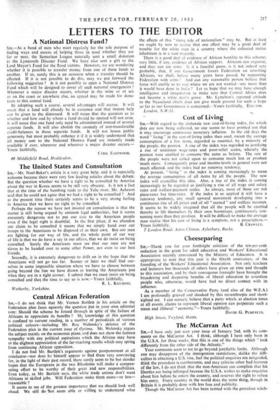Cost of Living
Sut,—With regard to the elaborate new cost-of-living index, for which data are now being collected, no one seems to have pointed out that it may encourage continuous monetary inflation. In the old days the word "living," in the cost-of-living index then used, meant the average consumption of a few items, regarded as essential, by a minority of the people, the poorest. A rise of the index was regarded as justifying a rise of minimum wage-rates and poor-relief scales, whereby the poorest were enabled to consume-'the same as before. The rest of the people were not called upon to consume much less or produce 'much more. Consequently price and income-levels in general were not much affected, and the index had no runaway tendency.
At present, " living " in the index is coming increasingly to mean the average consumption of all items by all the people. The new index will crystallise this idea. Also, a rise of the index is coming increasingly to be regarded as justifying a rise of all wage and salary rates and welfare-payment scales. As always, most of these arc not piece-rates but time-rates. If the index is so applied it will have a runaway tendency, any small upward movement developing into a continuous rise of all prices and of all " earned " and welfare incomes. It seems to be widely imagined that all the people will be enabled thereby to lift themselves by their own bootstraps, continuously con- suming more than they produce. It will be difficult to make the average man realise that his cost of living is a symptom, not a prescription.—


































 Previous page
Previous page